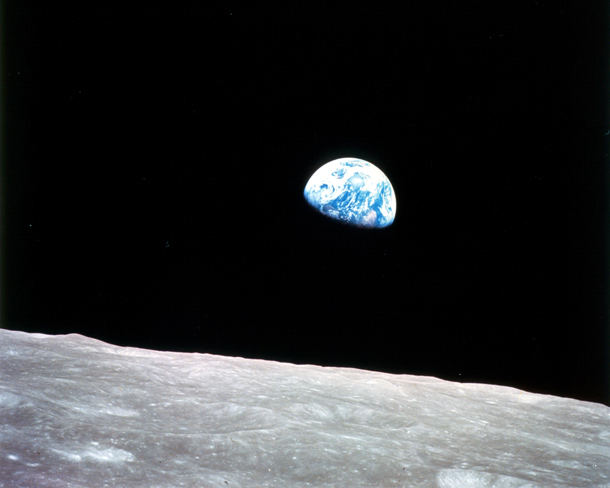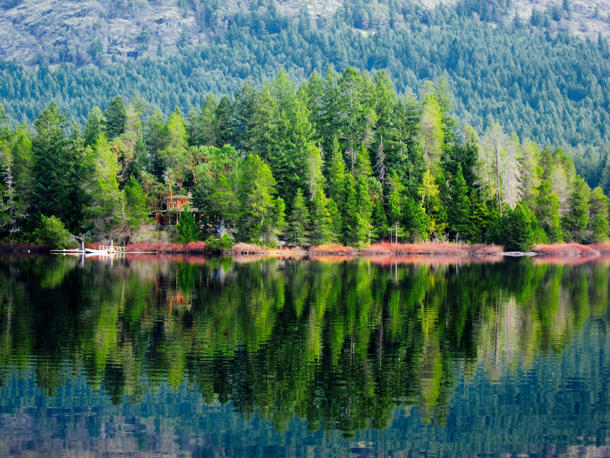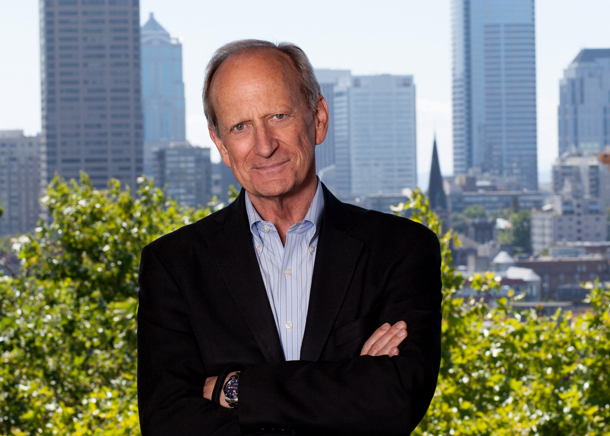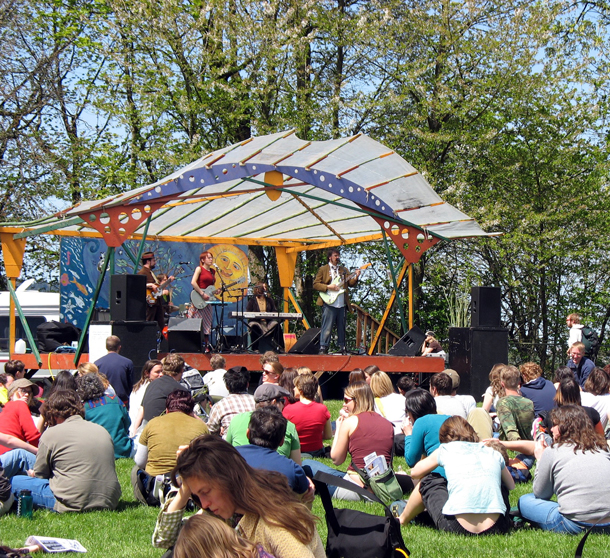Earth Day Turns Fifty
Air Date: Week of April 17, 2020

Earthrise is the image of planet Earth taken from the Apollo spacecraft during the first manned mission to the moon, led by NASA in 1968. This event has continuously sparked interest in the beauty of the earth, and the possibilities brought forth by science. (Photo: NASA, www.earthday.org, Public Domain)
April 22nd, 2020 marks the 50th anniversary of the first Earth Day, when some 20 million Americans peacefully rallied for protecting the planet. Host Steve Curwood speaks with Denis Hayes, coordinator of that very first Earth Day and founder of the Earth Day Network, about what April 22, 1970 was like, and how this year’s grand Earth Day plans have adapted to the disruptions caused by the coronavirus pandemic.
Transcript
CURWOOD: It’s Living on Earth, I’m Steve Curwood.
Back during the Vietnam War the United States was rocked with sometimes violent anti-War protests including in the Spring of 1970. So there was a sense of relief when some 20 million Americans peacefully marched and rallied on April 22nd for the very first Earth Day. And for that moment, people from just about all parts of the political divide came together to call for a cleanup of our planet.
[MUSIC: Crosby, Stills, Nash & Youg, “Ohio” on So Far, Atlantic Recording Corp.]
CURWOOD: But the truce over public demonstrations would end less than two weeks later when Kent State University students protesting the US bombing of neutral Cambodia set fire to an ROTC building, and National Guard soldiers later shot and killed 4 unarmed student protestors.
[MUSIC: Crosby, Stills, Nash & Youg, “Ohio” on So Far, Atlantic Recording Corp.]
CURWOOD: But thanks to that first Earth Day, the modern environment movement had come alive. Joni’s Mitchell’s environmental anthem "Big Yellow Taxi" came out the same month as the first Earth Day.
[MUSIC: Joni Mitchell, “Big Yellow Taxi”]
MITCHELL [SINGING]: They paved paradise
And put up a parking lot
With a pink hotel, a boutique
And a swinging hot spot
Don't it always seem to go
That you don't know what you've got til its gone
They paved paradise
And put up a parking lot . . .
CURWOOD: As well as Earth Day, 1970 would see the creation of the EPA, and the passage of major laws, including the Endangered Species and Clean Air Acts. Denis Hayes was the national coordinator of that first Earth Day, which is now celebrated in nearly every country on earth and considered the largest secular holiday in the world. He went on to found the Earth Day Network. He joins me now. Denis Hayes, welcome back to Living on Earth!
HAYES: It's always a pleasure, Steve.
CURWOOD: So Dennis Hayes, take us back to April 22, 1970. That very first Earth Day, beginning in the morning, where were you?
HAYES: Well, I rolled out of bed in my decrepit little basement one-room apartment on Dupont Circle and walked down to the National Mall before daybreak, where we had a daybreak ceremony with Native Americans who were welcoming the sun; then raced off, jumped on a plane and flew up to New York. And after weaving through massive tangled traffic, got to the stage where they directed around Fifth Avenue, where I had a speaking role and climbed up really high and I, you know, it's 50 years ago, I can't really tell you the height, but my sense is 60, 70 feet at least, and looked out to the crowd that are dissembled on Fifth Avenue spilling like 40, 45 blocks towards Central Park. And it was literally like looking at the ocean. There were people out beyond the sight horizon, which is when I really first began to feel the power of this whole thing.
CURWOOD: So how many folks do you think were there?

Earth Day Network’s mission is to diversify, educate and activate the environmental movement worldwide. (Photo: Nick Kenrick, Flickr, CC BY 2.0)
HAYES: Well, I would guess upwards of a million people in Manhattan, and the estimates from the wire services for the country as a whole -- and of course, nobody's counting noses because Earth Day was in literally every city, every town, every crossroads in America -- but the generally accepted number was 20 million people, which was almost one out of every 10 Americans participating. Earth Day 1970 was a great surprise, our aspirations when we started out -- the very start was to have teach-ins on college campuses, which turned out not to work in part because college campuses weren't at that point interested in the environment and teach-ins were passé. And when we moved away from environmental teaching, renamed it Earth Day, took it out into communities, the hope was to have something that was equivalent to say the Vietnam moratorium, or the March on Selma or the March on the Pentagon, a one-time event that would take some important issue, gather enough people that it would generate news coverage and help educate the public about that issue. When it instead turned out to be something that wasn't just in six or eight cities, but in literally dozens and dozens of cities in every other sized community across the country, where we had an estimated 2000 colleges and universities that had something going on. It was just massive. And, one, it was exciting, because it was so much larger than we'd anticipated when we began. And then in retrospect, it became unique in that unlike the March on the Pentagon, it was not a one-time thing. It came back again without much-centralized organizing. In fact, I was trying to kill it in 1971, because we knew it would have to be smaller than in 1970. And that would feed into a media narrative that this was, in fact, a fad. And the support is declining because you can't get 20 million people time after time, out. But then it went on to '72 and '73. And by the time we got to 1990, it was established as a, it's almost a national holiday, it appears on calendars, teachers put it in their lesson plans, and everybody just expects it every year.
CURWOOD: You're often quoted with a line that you gave at the rally in Washington. I wonder if we could hear it again.
HAYES: Sure. 1970 came out of the 1960s. So there were a lot of issues parading across the American political stage, including dominantly, the anti-war movement, the civil rights movement, the beginnings of the feminist movement, huge cultural issues around the Summer of Love in San Francisco and Woodstock, which didn't play that well in the middle of the country. And there was some tendency in some quarters to think this environmental thing is another little thing that's coming across and it's just going to be a passing fad. And I made the case fairly strongly that "if this is a fad, it's going to be our last fad."
CURWOOD: So let's put this in some historical context. Denis Hayes, tell me more about the oil spill off the California coast near Santa Barbara in 1969.
HAYES: Sure, and two Earth Days actually had oil spill sort of feed-ins. In 1969, the first big oil spill to really capture public attention in the United States took place off of a fairly well-heeled California community with white sand beaches that just turned into a tarry mess. And there was a huge citizen uprising, but unlike many which were in communities of color, or were in communities that were sort of middle class, this was a bunch of rich people, on the streets demanding, Get the Oil Out, an organization called GOO and that was something that really captured everybody's attention in that, one, it had all these poignant scenes of sea life that was being covered with oil and suffocating. But the other was that it brought home that these pollution issues were something that could capture any part of American life, even a place like Santa Barbara. Then 20 years later, as we were going into the 1990 Earth Day, which was the first time we took it international, then we had the Exxon Valdez, the previous year off the coast of Alaska with a much larger oil spill. I suspect there were some people that thought that I was timing Earth days to follow major oil spills because the two first really big ones were in that context.
CURWOOD: How accurate is it to say that Wisconsin Democrat, Gaylord Nelson, the senator was inspired to create Earth Day upon seeing that huge lick of oil off of Santa Barbara there?
HAYES: Yeah, I think it certainly was one of the starter engines in some of the, what should we call them, the creation myths from the beginnings of this; Gaylord, the idea occurred to him as he was flying over Santa Barbara. I think the idea actually first occurred to him in some conversations with Fred Dutton, the political consultant, but you tell these things in the ways that are the most dramatic. And clearly, the Santa Barbara oil spill along with Silent Spring, and the Population Bomb, and the quality of air in Pittsburgh and Gary and Los Angeles, and the Cuyahoga River catching on fire and the predictions that the Great Lakes were dying, and, you know, all of those things were coming together as separate strands and Gaylord had a sense that all of them, if packaged together could actually be something of some real political input. And he was, I think, certainly the first major politician to have that sense.

Denis Hayes coordinated the first Earth Day in 1970. He also founded the Earth Day Network and expanded it to more than 180 nations. (Photo: Courtesy of Denis Hayes)
CURWOOD: Now, why do you liken environmental initiatives to a global war, Denis?
HAYES: When you're trying to bring people together, nothing brings them together more than a common enemy. If you have a 9/11 and then suddenly America rises up in unison, or with Pearl Harbor. With regard to environmental issues globally, we've had great difficulty doing that in an era, particularly of mounting nationalism. And what we've been trying to do with environmental issues as much as we do with a pandemic, is to view this as a threat to Homo sapiens, where the entire species has to come together to protect itself.
CURWOOD: So today, 2020, 50 years after, what is the focus of Earth Day, what are the initiatives that are now being emphasized?
HAYES: The core purpose of the 50th anniversary of Earth Day was to finally take the climate emergency seriously, not as a subject for additional reports, not as a subject for additional international conferences, not to spin our wheels with voluntary activities, but to take something akin to the Green New Deal proposed domestically and take that out internationally with people around the world going out into the streets in mass crowd demonstrations. Everything from Pope Francis who'd agreed to address a very large crowd at St. Peter's Square to things in Rio de Janeiro, things in Kolkata. We hoped to have 750,000 people on the National Mall in Washington DC, to stand there and just demand that we finally get serious about this issue and move boldly, not with a $15 a ton tax on carbon, but it was initiatives that will really change the game dramatically. The downside is we spent two years organizing these things. And when COVID-19 reared up and quickly, within a month spread to be a global phenomenon. Literally, everything that we had spent two years organizing became illegal. I mean, where we wanted to have 750,000 people on the National Mall, it would now be illegal to have more than 10. So it has been a hugely frustrating experience. Nonetheless, it's our belief that the time is right, the student climate strikers around the world have certainly captured public attention; efforts out of the Paris accord, although repudiated by Trump for the United States, and hence sort of gutted will be pulled back together and that will perform a little bit more. And then, of course, there's simply all of the events that Mother Nature is bringing us from the wildfires in Australia to the rising seas that are flooding repeatedly, places from Miami to Hawaii and the United States. It's coming together now where there's not the ambiguity that was attending climate change in 990, when it was done, mostly discussed as two lines passing on a graph 20 years in the future. Now those lines have crossed and the real world is demanding attention.
CURWOOD: Now the 50th anniversary of Earth Day was entitled Earth Rise 2020. Without the ability to have the massive crowds together on Earth Day, how will you bring people together in that moment?
HAYES: We're going to have streaming events. And well, Pope Francis won't be at St. Peter's Square, he'll be giving his little video to us as well as a bunch of other leaders from various sectors, political, scientific entertainment, sports, bringing brief messages interlaced with hopefully some prominent musicians playing entertaining music out of their living rooms into video, and maybe some film clips, some animations, stuff that pulls people together and carries an educational message forward. And the people that the Earth Day network is just busting their tails to try to make this just as effective as possible. candidly, there just isn't any potential substitute for 750,000 people on the Mall in Washington DC in terms of political impact, so we're going to do our best to salvage it. But the most important things will probably be in the months after that is hopefully COVID-19 fades from absolutely dominating all news coverage, and we try to carry on what was already beginning to happen, which is that climate would become an ever more important political issue voting issue in the United States.

Earth Day 2020 events are scheduled to happen virtually, due to the coronavirus outbreak. (Photo: Kevin Turner, Flickr, CC BY-NC 2.0)
CURWOOD: What does COVID-19 tell us about the climate, Denis?
HAYES: Well, if I move to uncharacteristic optimism, you could think that COVID-19 shows pretty clearly the interdependence of the world and the need for some kind of global authority like the World Health Organization that will summon expertise until individual nations what they must do on behalf of all of humanity, that has a lot of analogies to climate change.
CURWOOD: So you talk about Earth Day becoming more and more political and these times focusing on the urgent need to deal with the climate. How can you get people to change their minds? How can you get people to focus on this who right now dismiss it?
HAYES: The very strange things about the environmental movement is that there is a division within it between people who are interested in politics and policy and people who are interested in behavior and lifestyle and consumption. And they tend not to cross over very much. One reason why we had a Dirty Dozen campaign was that the lifestyle people did not want us to endorse anybody. And the political people said, Hey, you had 20 million people in the streets and you're going to ignore an election. And so the compromise was we would not endorse any political candidates, but we would oppose political candidates because that allowed us to pull both halves into that initiative. On climate, there's a similar sort of thing that people who focus on international agreements that focus upon neoliberal economic solutions, taxes, cap and trade. People who focus on the Green New Deal, tend, in general, to be a little bit dismissive of the people who are saying, you ought to be paying attention to your diet and eating a little bit lower on the food chain, you need to pay attention to what car you drive and what kinds of appliances you buy, and how much you travel around in jets because you multiply that stuff times 300 million Americans and seven and a half billion people, and it really adds up. And those are choices you can make, the government can't stop you from making, I tend to come right smack down on top of both. You have to be doing all of those things. And one of the messages this Earth Day, although it intended to be principally political is going to be what you can do as an individual. And there are lots of reasons for that. One is the actual impact of those in the aggregate. Another is that when you get people to actually behave in some fashion, they work harder on behalf of the beliefs and the values that underpin that action. That's something religions discovered 2000 years ago. And finally, when you're trying to persuade people on the other side are people who are undecided about something but you are walking your talk you are living the values that you were trying to portray to them, they'll view is somebody that lives with integrity. And one of the things that has hurt us a little bit has been people who are hypocrites, who fly in their personal jets to a rally to give a speech on energy conservation. And people come because they're celebrities and their crowd magnets, but they don't take their content that seriously. Because if you're serious, you don't fly your individual jet to that rally.
CURWOOD: One of the ironies of Earth Day at age 50, is that, this year, the Earth is the quietest that it's been probably in the last maybe even 50 years. With so many people in the industrialized part of the world, staying inside, with so much industrial and other activity stopped or tamped down. People are talking about hearing birds in Manhattan. What do you think of the Earth herself perhaps taking this moment to celebrate herself?
HAYES: You know, there is something to be said for the powerful role that Mother Nature is playing and that you can ignore her for a little while, but sooner or later she will assert herself. And that's... pandemics are clearly one of the ways that that happens. A really interesting thing about COVID-19 and its impact on the industrial world is whether it will lead, not to some temporary reductions in carbon emissions and air pollution, but whether there will be any kinds of permanent behavioral changes. We are all working from home. And some of us are able to spend more time with our families, we're recognizing that the commute whether it's in a car or a bus, or mass transit is wasted time, and it's nice to be not having to waste that time. So let's say that in America, of those people who are not in jobs that require them to be at the restaurant or at the hospital, but in an office where some of that work could be done at home if each in the future just stayed home one day a week and worked from home that would reduce the commuting by 20%, and the pollution by 20%, and the energy consumption by 20%. And give them free time and you'd be doing something more productive with. If we're all eating at home instead of eating in restaurants. And some of us are planting gardens that hadn't had gardens before. Is that something that will continue? It might be leading to a healthier population and guaranteed food where you don't cook more than you're actually going to be eating. And if there is some leftovers, you can just stick them in the refrigerator, so there's less food waste. They can be genuinely organic and local because they're out of your own backyard. I think a great many people are finding relaxation relief, a lack of stress, despite the stress of the disease itself, coming out of the public response to COVID-19. And it's possible that there will be some beneficial changes that will come and will be permanent.
CURWOOD: Denis Hayes was the national coordinator of the first Earth Day back in 1970. And he's presently president of the Bullitt Foundation, environmental philanthropy in Seattle. Dennis, thanks so much for taking this time with us.
HAYES: Steve, it's been a pleasure, all 30 years that we've been doing this.
Links
Living on Earth wants to hear from you!
Living on Earth
62 Calef Highway, Suite 212
Lee, NH 03861
Telephone: 617-287-4121
E-mail: comments@loe.org
Newsletter [Click here]
Donate to Living on Earth!
Living on Earth is an independent media program and relies entirely on contributions from listeners and institutions supporting public service. Please donate now to preserve an independent environmental voice.
NewsletterLiving on Earth offers a weekly delivery of the show's rundown to your mailbox. Sign up for our newsletter today!
 Sailors For The Sea: Be the change you want to sea.
Sailors For The Sea: Be the change you want to sea.
 The Grantham Foundation for the Protection of the Environment: Committed to protecting and improving the health of the global environment.
The Grantham Foundation for the Protection of the Environment: Committed to protecting and improving the health of the global environment.
 Contribute to Living on Earth and receive, as our gift to you, an archival print of one of Mark Seth Lender's extraordinary wildlife photographs. Follow the link to see Mark's current collection of photographs.
Contribute to Living on Earth and receive, as our gift to you, an archival print of one of Mark Seth Lender's extraordinary wildlife photographs. Follow the link to see Mark's current collection of photographs.
 Buy a signed copy of Mark Seth Lender's book Smeagull the Seagull & support Living on Earth
Buy a signed copy of Mark Seth Lender's book Smeagull the Seagull & support Living on Earth

